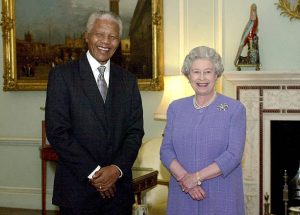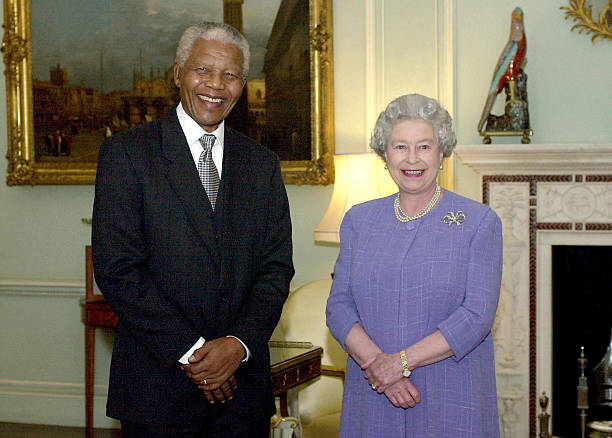 |
| Nelson with Elizabeth |
Nelson
Mandela
Mandela was born into associate degree aristocratical family
in Mwezo, British South Africa. He studied law at the University Fort Hare and
also the University of the Rand and started his career as a professional in
urban center. There he became concerned in anti-colonial activities and African
nationalist politics and joined the African National Congress in 1943 and
contend a full of life role in initiation the Youth League in 1944. He actively
participated within the anti-apartheid movement because the leader of the armed
organization Umkhanto we have a tendency to Sizwe. In 1962, he was in remission
by the social policy government of South Africa and sentenced to imprisonment
for varied crimes together with assassination. Mandela was jailed for twenty seven
years. Most of this point he was on Robben Island. He was discharged from jail
on Gregorian calendar month eleven, 1990. Once this he participated in peace
talks with the white government of South Africa on behalf of his party. This
resulted within the finish of social policy in South Africa and also the
institution of democracy in 1994 with the participation of individuals of all
races.
Considered a symbol of democracy and social justice, Mandela
has received more than 250 awards. Notable among these are the Bharat Ratna
Award in 1990 AD and the Nobel Peace Prize in 1993 AD given by the Government
of India. Moreover, he jointly won the inaugural Shakharov Award in 1988. In
South Africa, Mandela is known to his tribe as Madiba, which means “father
of the nation”.
Early life
Nelson Mandela was born into the cadet branch of the Thembu
dynasty. The Thembu dynasty is the ruler of the Transkei region of the Cape
Province of South Africa. He was born in the village of Mwezo near Umtata, the
capital of Transkei. His great-grandfather was Ngubengchuka (d. 1832), who was
Inkosi Nkhulu, or King, of the Thembu clan. This king’s son Mandela is Nelson
Mandela’s grandfather. Nelson’s family name Mandela is derived from this
grandfather. However, as Nelson’s paternal grandmother belonged to the Ixhiba
tribe, according to tradition, none of her descendants had the right to ascend
to the Thembu dynasty.
Mandela’s father, Gadla Henry Mpakanaisa, served as Mwezo
village headman. However, after the colonial rulers became disaffected, they
deposed Mandela’s father. He then settled in Kunu village with his family.
Mpakanaisa was nevertheless a member of the Inkosi’s Privy Council and was
instrumental in electing Jongintaba Dalindyebo as ruler of Thembu. Dalindyebo
adopted Mandela as his adopted son after Mpakanisa’s death. Mandela’s father
Mpakaneisa had four wives, and a total of 13 children (4 sons, 9 daughters).
Mandela’s mother was Mpakaneisa’s 3rd wife Nosekeni Fanny. Fanny was the
daughter of Nkedama of the Mpembhu Xhosa clan. Mandela spent his childhood in
his maternal grandfather’s house. His nickname “Rolihlahla” means
“the one who breaks the branch”, i.e. “naughty boy”.
Mandela was the first member of his family to attend school.
During his schooling, his teacher Mdingane gave him the English name
“Nelson”.
Political
activities
The African National Party won the 1948 elections in African
country. This cluster believed in social policy and was in favor of keeping
totally different castes separate. Nationalist leader became actively concerned
in politics within the wake of the National Party’s rise to power. He
semiconductor diode the African National Congress’s 1952 non-cooperation
movement. He contend a crucial role within the People’s Conference of 1955 AD.
The conference created the freeing charter that was the cornerstone of the
anti-apartheid movement in African country. Throughout this point, nationalist
leader and his friend, professional person jazzman Tambo, ran a house known as
nationalist leader & Tambo. The organization provided cheap legal aid to
poor black Africans World Health Organization couldn’t afford a professional
person.
In the early a part of Mandela’s political career, he was
influenced by the philosophy of Mohandas Karamchand Gandhi. Anti-apartheid
activists in African country opposed social policy early within the movement,
adopting Gandhi’s principles of non-violent movement. Nationalist leader was
conjointly a advocate of non-violent movement from the start. However South
Africa’s social policy white government in remission one hundred fifty
anti-apartheid activists, together with nationalist leader, on charges of
treason on December five, 1956. The case lasted for five long years
(1956-1961), however at the tip of the trial all the defendant were found
innocent.
Between 1952 and 1959, black activists from radical
Africanist factions began to disrupt varied activities of the African National
Congress (ANC). Africanists favored extremist movements against the social
policy white government. ANC leaders Prince Albert Luthuli, jazzman Tambo and
director Sisulu felt the Afrikaners were too hasty within the movement, denying
their leadership.
Anti-apartheid
struggle
In 1961, Mandela assumed leadership of the ANC’s armed wing
Umkhonto we Sizwe (meaning “Ball of the Country”, abbreviated MK). He
was the co-founder of this organization. He planned and coordinated
assassination and sneak attacks against the apartheid government and its army.
Mandela also planned to go to guerrilla warfare if necessary if the apartheid
government did not back down. Mandela also began working abroad to raise funds
and arrange military training for the MKs.
Mandela’s colleague Wolfie Kadesh said about the armed
movement started under Mandela’s leadership, “When we knew that we [sic]going to start on 16 December 1961, to blast the symbolic places of apartheid,
like pass offices, native magistrates courts, and things like that … post
offices and … the government offices. But we were to do it in such a way that
nobody would be hurt, nobody would get killed.” Mandela said about Wolfie,
“His knowledge of warfare and his first hand battle experience were
extremely helpful to me.”
Mandela himself called his armed movement a last-ditch
effort against apartheid. He realized that the non-violent movement against the
long-standing oppression and tyranny of the South African government would not
be successful and therefore chose the path of armed movement.
Arrest and
Rivonia case
Mandela was inactive on August five, 1962 when being in
exile for regarding seventeen months. He was detained within the Fort of urban
center. The U.S. intelligence United States intelligence agency familiar the
South African security police regarding Mandela’s movements and disguises, leading
to Mandela’s capture. 3 days later he was charged with leading the 1961 labor
strike and illicitly going the country. On October twenty five, 1962, Nelson
Rolihlahla Mandela was sentenced to five years in jail for these 2 charges. 2
years later, on eleven Gregorian calendar month 1964, Nelson Rolihlahla Mandela
was charged and sentenced for leading the ANC’s armed struggle.
While Nelson Rolihlahla Mandela was in jail, the police
inactive the ANC’s high leaders on eleven Gregorian calendar month 1963 at
Lillesleaf Farm in Rivonia, close to urban center. Nelson Rolihlahla Mandela
was conjointly suspect during this case called the ‘Rivonia case’. The
government’s chief professional, Dr Percy Utter Nelson Rolihlahla Mandela,
suspect ANC leaders of assassination. They were conjointly charged with
violation. Nelson Rolihlahla Mandela pleaded guilty to assassination charges. However
Nelson Rolihlahla Mandela denied a treason charge for conspiring against
Republic of South Africa as Associate in nursing agent of a far off power.
Imprisonment
Prison premises on Robben Island.
Mandela’s prison cell on Robben Island. He was imprisoned
here for a long time.
Mandela’s imprisonment began in jail on Robben Island. Here
he spent the primary eighteen years of his 27-year imprisonment. Throughout his
time in jail, his fame round the world grew. He became well-known throughout
the globe as South Africa’s most vital black leader. Nationalist leader and his
fellow inmates were forced to figure as laborers during a stone quarry at the
Robben Island jail as a part of a harsh jail sentence. The jail conditions were
quite deplorable. Social policy additionally existed in prisons. Black
prisoners got the smallest {amount} amount of food. Political prisoners were
unbroken become independent from common criminals. Political prisoners had
fewer privileges than standard criminals. Nationalist leader wrote in his life
that he was thought-about a D-group captive, that is, he was placed on the list
of the smallest amount privileged prisoners. He was given just one letter each
half dozen months and allowed just one visitant. Letters written to nationalist
leader were long withheld by jail censors. Several components of the letter
were blacked out with ink before it had been two-handed to nationalist leader.
Release
On February 2, 1990, the then president of South Africa, FW
D Klerk, lifted the ban on the African National Congress and other
anti-apartheid organizations. At the same time he announced that Mandela will
be released soon. Mandela was released from Victor Verster Prison on February
11, 1990. Mandela’s release was broadcast live around the world.
Peace talks
After his release, Mandela assumed leadership of the African
National Congress. He was the leader of this party from 1990 to 1994. During
this time he negotiated with the government to end apartheid in South Africa.
After the peace talks were successful, in 1994 general elections were held for
the first time in the history of the country with the participation of people
of all castes.
In April 1993, the leader of the African National Congress, Chris
Honey, was assassinated. The killings have sparked fears of violence spreading
across the country. Mandela appealed for peace in a speech to the nation.
Mandela was not the president of South Africa at that time. Despite this,
Mandela said in a presidential speech,
“Tonight I am reaching out to every single South African, black and white,
from the very depths of my being. A white man, full of prejudice and hate, came
to our country and committed a deed so foul that our whole nation now teeters
on the brink of disaster. A white woman, of Afrikaner origin, risked her life
so that we may know, and bring to justice, this assassin. The cold-blooded
murder of Chris Hani has sent shock waves throughout the country and the world.
…Now is the time for all South Africans to stand together against those who,
from any quarter, wish to destroy what Chris Hani gave his life for – the
freedom of all of us”.

